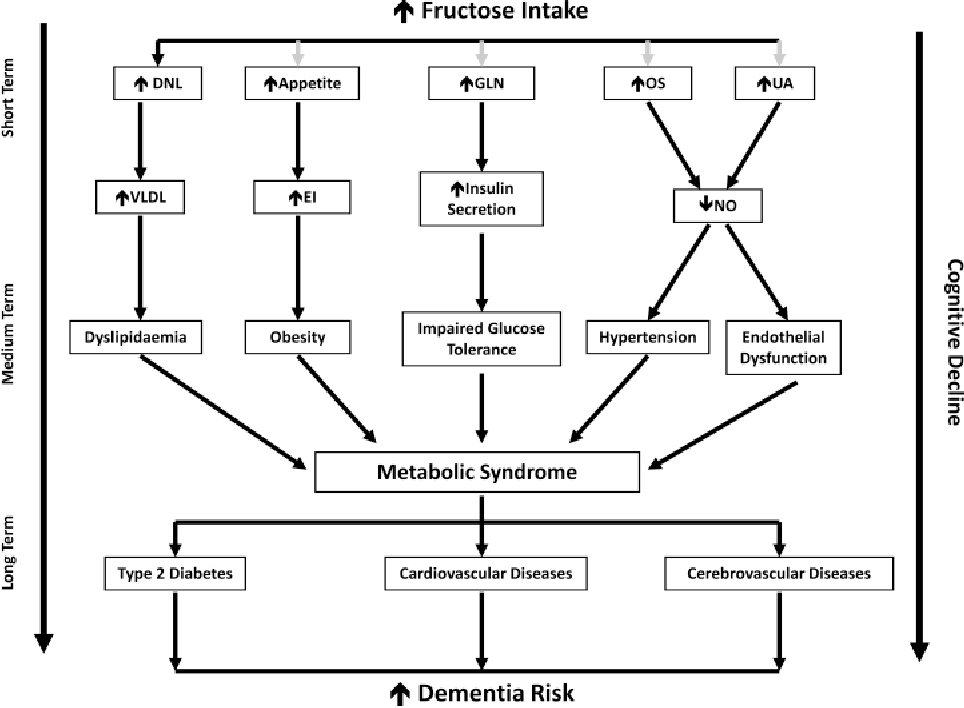Increase in neurodegenerative diseases such as Alzheimer’s disease and Parkinson’s disease, and in several psychiatric disorders in recent years are in correlation with the drastic changes in food and lifestyle being witnessed in the last few decades. Several reports now indicate a possible link between the modern diet and these neurological and psychiatric disorders.

Lakhan SE, Kirchgessner A. The emerging role of dietary fructose in obesity and cognitive decline. Nutr J 2013;12:114. https://doi.org/10.1186/1475-2891-12-114. Available at https://nutritionj.biomedcentral.com/articles/10.1186/1475-2891-12-114
Stephan BCM, Wells JCK, Brayne C, Albanese E, Siervo M. Increased Fructose Intake as a Risk Factor For Dementia. Available at https://watermark.silverchair.com/glq079.pdf
Diet is linked to mental health: Jacka FN, Kremer PJ, Berk M, de Silva-Sanigorski AM, Moodie M, et al. A Prospective Study of Diet Quality and Mental Health in Adolescents. PLoS ONE 2011;6(9):e24805. doi:10.1371/journal.pone.0024805 [Full Text] | Felice N. Jacka et al. The Association Between Habitual Diet Quality and the Common Mental Disorders in Community-Dwelling Adults: The Hordaland Health Study
Psychosomatic Medicine July 2011;73(6):483-490 [Abstract]
Diet and Obesity May be Linked to Alzheimer’s: A Swedish study that included 8,534 twins over the age of 65, has found that the risk of dementia was almost double in those who were overweight versus those of normal weight and those who were obese had almost a fourfold increase in risk. [Johansson K at al. Longer term effects of very low energy diet on obstructive sleep apnoea in cohort derived from randomised controlled trial: prospective observational follow-up study BMJ 2011; 342:d3017 Abstract | Report | Older Paper]
Metabolic Syndrome Increases Age Related Memory Loss: A French study reports that several components of metabolic syndrome may be associated with age related cognitive decline [Abstract – Neurology February 8, 2011 vol. 76 no. 6 518-525]
Exclusive Breastfeeding helps to Boost IQ, has Favourable Effects on Height, Weight and Blood Pressure: Largest Prospective Study Finds Breastfeeding and Child Cognitive Development: New Evidence From a Large Randomized Trial; Effects of prolonged and exclusive breastfeeding on child height, weight, adiposity, and blood pressure at age 6.5 y: evidence from a large randomized trial; Effects of Prolonged and Exclusive Breastfeeding on Child Behavior and Maternal Adjustment: Evidence From a Large, Randomized Trial; Reports 1; 2; 3
Processed Food Diet in Early Childhood may Lower IQ: The Avon Longitudinal Study of Parents and Children, which tracks the long term health and wellbeing of around 14,000 children born in 1991 and 1992, has found that a predominantly processed food diet at the age of 3 was associated with a lower IQ at the age of 8.5, whereas a healthy diet was associated with a higher IQ at the age of 8.5. Press Release | Report]
ADHD is Associated With a ‘Western’ Dietary Pattern in Adolescents, Australian Study Finds The study involving 1,799 adolescents on 14-year follow-up has found that a diet high in the Western pattern of foods was associated with more than double the risk of having an ADHD diagnosis compared with a diet low in the Western pattern, after adjusting for numerous other social and family influences [Howard AL et al. ADHD Is Associated With a ‘Western’ Dietary Pattern in Adolescents. Journal of Attention Disorders, 2010; DOI: 10.1177/1087054710365990. Abstract | Report]
Glucose increases and fructose reduces brain activity: A functional brain magnetic resonance imaging (fMRI) study at Oregon Health and Science University has found that infusion of glucose enhances brain cortical activity but fructose infusion has the opposite effect, with reduced activity. While bigger studies are needed to confirm the findings, this may be one of the clues for patterns of our behaviour in general, and food consumption in particular. [Abstract from Purnell JQ et al. Brain functional magnetic resonance imaging response to glucose and fructose infusions in humans Diabetes, Obesity and Metabolism March 2011;13(3):229–234. | Report]
Eating nuts may enhance mood: [See]
Fish Oil May Reduce Psychosis in High-Risk Individuals
G. Paul Amminger et al., Arch Gen Psychiatry February 2010 | Report
Mediterranean Diet May Have a Protective Role Against Depression Abstract of Sánchez-Villegas A et al., Arch Gen Psychiatry
Low-Glycemic-Index Diet Appears to Modulate Alzheimer’s Biomarker: A 4-week diet intervention study has found that healthy cognitively intact older adults who stuck to a low-saturated-fat, low-glycemic-index diet experienced decreases in cerebrospinal fluid (CSF) levels of β-amyloid 42, a biomarker of Alzheimer’s disease risk. [Bayer-Carter JL at al. Diet Intervention and Cerebrospinal Fluid Biomarkers in Amnestic Mild Cognitive Impairment. Arch Neurol. 2011;68(6):743-752. doi:10.1001/archneurol.2011.125 | Report]
Berries may prevent Alzheimer’s disease: Eating blueberries, blackberries, strawberries may prevent cognitive decline, study finds. Miller MG, Shukitt-Hale B. Berry Fruit Enhances Beneficial Signaling in the Brain. J. Agric. Food Chem. DOI: 10.1021/jf2036033. [Abstract | Report]
